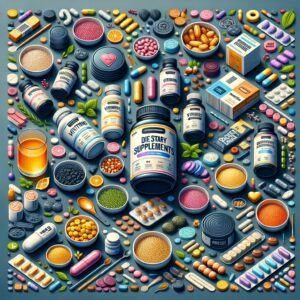In today’s health-conscious world, nutritional supplements have become an integral part of many people’s wellness routines. With countless options available on the market, selecting the right supplement can be overwhelming and confusing.
This comprehensive guide aims to simplify your journey by clearly defining what nutritional supplements are, highlighting trusted global brands, identifying key indicators for supplementation needs across different age groups, especially seniors, and revealing the most beneficial supplement for overall health.
Additionally, we’ll explore how to safely evaluate and purchase supplements online while clarifying misconceptions surrounding the FDA approval process. Whether you’re looking to fill dietary gaps or enhance your overall well-being, this comprehensive guide provides essential insights to help you make informed decisions, specifically tailored to achieve optimal health.

Nourish Your Body, Fuel Your Potential—Start with GreatLife Supplements.
1. Understanding Nutritional Supplements: Definition and Examples
Nutritional supplements, commonly referred to as dietary supplements, are products designed to complement the diet by providing essential nutrients that may be missing or insufficiently consumed through regular food intake. These supplements typically include vitamins, minerals, amino acids, enzymes, herbs or botanicals, probiotics, and other substances beneficial for health maintenance and improvement. They come in various forms such as capsules, tablets, powders, liquids, gummies, or energy bars.
Examples of nutritional supplements encompass a wide range of categories tailored toward specific health needs. Vitamins like Vitamin C support immune function while Vitamin D aids calcium absorption for bone strength; minerals such as iron help prevent anemia whereas magnesium contributes to muscle relaxation and nerve function.
Omega-3 fatty acid supplements derived from fish oil promote cardiovascular health and cognitive performance. Herbal extracts, such as echinacea, are often used to boost immunity during cold seasons. Probiotics containing beneficial bacteria strains help maintain digestive system balance.
Additionally, protein powders—commonly whey or plant-based—are popular among athletes aiming at muscle growth and recovery post-exercise sessions. Amino acid formulations including branched-chain amino acids (BCAAs) also play significant roles in athletic performance enhancement by reducing fatigue levels during intense physical activity.
Understanding these diverse supplement types allows individuals to make informed decisions regarding their personal wellness goals based on lifestyle factors such as age groupings (children versus seniors), gender-specific requirements (prenatal vitamins for pregnant women), dietary restrictions due allergies/intolerances (gluten-free options available), fitness objectives ranging from weight loss management up through bodybuilding aspirations—all contributing positively towards optimal overall wellbeing when appropriately selected according individual circumstances alongside professional guidance where necessary.

Support Your Immune System Naturally—Explore Our Health Essentials Today.
2. Identifying the Most Popular and Trusted Supplement Brands Globally
When selecting nutritional supplements, brand reputation plays a critical role in ensuring product quality, safety, and efficacy. Several global brands have consistently earned consumer trust through rigorous testing standards, transparent labeling practices, and positive user feedback.
Nature Made is one of the most recognized supplement brands worldwide, thanks to its commitment to quality assurance processes verified by third-party organizations, such as the United States Pharmacopeia (USP). This certification ensures that their products meet stringent purity and potency criteria. Similarly, NOW Foods has established itself as a trusted global brand by adhering strictly to Good Manufacturing Practices (GMP) while offering an extensive range of affordable, yet high-quality, supplements.
Another prominent player in the industry is Garden of Life, renowned for its organic formulations that are free from synthetic additives and genetically modified ingredients. Their transparency regarding sourcing methods resonates strongly with health-conscious consumers seeking natural alternatives. Additionally, Thorne Research stands out among healthcare professionals for its science-backed formulas, developed using clinical research data. This brand frequently collaborates with medical practitioners to ensure optimal therapeutic outcomes.
Nordic Naturals has also garnered international acclaim, particularly in the omega-3 fatty acid supplementation market, mainly due to its sustainably sourced fish oils combined with meticulous purification techniques that aim to eliminate contaminants such as mercury and PCBs. Finally, Solgar remains popular across multiple continents, thanks primarily to its decades-long consistency in delivering premium-grade vitamins and minerals, backed by comprehensive laboratory analyses that verify ingredient authenticity.
Selecting supplements from these reputable global brands significantly reduces risks associated with counterfeit products or substandard manufacturing practices commonly encountered elsewhere on less-regulated marketplaces worldwide.

Take Charge of Your Health—One Supplement at a Time.
3. Determining if You Need a Dietary Supplement: Key Signs and Indicators
Recognizing when dietary supplements may be beneficial is crucial for maintaining optimal health. One primary indicator is the presence of nutritional deficiencies, often identified through symptoms such as chronic fatigue, weakened immunity, brittle nails, or hair loss, and persistent digestive issues. These signs suggest that your diet alone might not provide sufficient nutrients to support overall wellness.
Another critical factor in determining the necessity of supplements involves lifestyle considerations. Individuals with restrictive diets, such as vegetarians or vegans, may lack essential vitamins like B12 or minerals, including iron and calcium, necessitating supplementation to prevent deficiency-related complications. Similarly, individuals with limited sun exposure may benefit from vitamin D supplements to help maintain bone density and immune function.
Age also plays a significant role in determining supplement needs; older adults often experience decreased nutrient absorption efficiency due to physiological changes associated with aging. Consequently, seniors frequently require an additional intake of vitamins, such as vitamin B6 and folate, or minerals like magnesium and potassium, to sustain their health effectively.
Additionally, certain medical conditions can signal the need for targeted supplementation. For instance, individuals diagnosed with osteoporosis may require calcium combined with vitamin D supplements to improve bone strength; similarly, pregnant women typically benefit from prenatal vitamins containing folic acid to support adequate fetal development.
Lastly, heightened physical activity levels increase nutritional demands significantly beyond standard dietary provisions alone. Athletes or highly active individuals often find value in protein powders or electrolyte replenishment products explicitly designed for enhanced performance recovery purposes.
Careful assessment of these indicators, combined with professional consultation, ensures informed decisions regarding dietary supplementation tailored precisely to individual health needs.
4. Top Recommended Supplements for Seniors Over 60
As individuals age, nutritional needs evolve, making supplementation increasingly essential to maintain optimal health and vitality. For seniors over 60, certain supplements are particularly beneficial in addressing common age-related concerns and deficiencies.
Calcium and Vitamin D stand out as essential supplements for seniors due to their role in maintaining bone density and preventing osteoporosis. Aging reduces the body’s ability to absorb calcium efficiently; therefore, supplementation can help prevent fractures and support overall skeletal health. Vitamin D enhances calcium absorption while also supporting immune function, mood regulation, and cardiovascular health.
Omega-3 fatty acids are another highly recommended supplement for older adults because of their anti-inflammatory properties that benefit joint mobility, cognitive function, heart health, and vision preservation. Regular intake of omega-3 fatty acids from fish oil or flaxseed oil has been linked to a reduced risk of dementia and improved memory retention.
Vitamin B12 supplementation is crucial since aging decreases stomach acid production necessary for absorbing this vitamin naturally from food sources. A deficiency in B12 can lead to fatigue, anemia, and neurological issues such as confusion or memory loss; therefore, regular supplementation helps maintain adequate levels.
Lastly, probiotics have gained recognition among senior populations due to their positive impact on digestive health, which involves balancing the composition of gut bacteria. This is particularly essential given the declining efficiency of the digestive system with age. Probiotics may also enhance immunity by promoting a healthy microbiome environment within the gastrointestinal tract.
Incorporating these targeted supplements into daily routines under the guidance of a professional can significantly improve quality-of-life outcomes among seniors aged 60 years or older, while effectively managing potential nutritional gaps associated with the aging process.

Your Health Journey Deserves the Best—Choose GreatLife Quality.
5. The #1 Supplement for Overall Health and Wellness Revealed
When considering overall health and wellness, Omega-3 fatty acids consistently emerge as the most beneficial supplement recommended by healthcare professionals. Derived primarily from fish oil, flaxseeds, chia seeds, and walnuts, Omega-3s play a critical role in supporting cardiovascular health by reducing inflammation, lowering triglyceride levels, and improving cholesterol profiles. Numerous clinical studies have demonstrated their effectiveness in decreasing the risk of heart disease, the leading cause of death globally.
Beyond cardiovascular benefits, Omega-3 supplements also significantly contribute to cognitive function and mental well-being. Regular supplementation has been linked to improved memory retention, enhanced concentration abilities, reduced symptoms of depression and anxiety disorders, as well as protective effects against age-related cognitive decline, such as dementia or Alzheimer’s disease.
Additionally important is Omega-3’s anti-inflammatory property that supports joint health by alleviating symptoms associated with arthritis or chronic inflammatory conditions. Athletes frequently utilize this supplement due to its ability to reduce muscle soreness post-exercise while promoting faster recovery times.

Unlock Peak Performance—Personalized Nutrition Starts Here.
6. How to Safely Choose, Evaluate, and Purchase Supplements Online (Including Amazon)
When purchasing nutritional supplements online, it’s essential to prioritize safety and authenticity. Begin by thoroughly researching the supplement brand’s reputation through customer reviews, third-party testing certifications, and independent review websites. Trusted brands typically provide transparent information about their manufacturing processes, ingredient sourcing practices, and quality assurance measures.
Always verify that the product label clearly lists all ingredients along with dosage instructions. Avoid products making exaggerated claims or promising immediate results; legitimate supplements offer realistic expectations backed by scientific evidence. Additionally, look for third-party certifications from reputable organizations, such as NSF International or the United States Pharmacopeia (USP), which confirm purity standards and accurate labeling.
When shopping on platforms like Amazon or other e-commerce sites, pay close attention to seller ratings and feedback scores. Opt for sellers who have high ratings, coupled with numerous positive reviews over an extended period—this indicates reliability in consistently delivering authentic products. Be cautious of unusually low prices compared to market averages; significantly discounted items may indicate counterfeit goods or expired stock.
Furthermore, ensure that secure payment methods are available before finalizing your online purchase—reputable websites will always use encrypted connections during transactions to protect sensitive financial data effectively. Lastly, carefully examine the return policies provided by both manufacturers and retailers so you can promptly address any issues regarding product quality upon receipt.
By diligently evaluating these factors when selecting nutritional supplements online—including careful consideration while using popular marketplaces such as Amazon—you can confidently safeguard your health investment while ensuring optimal effectiveness from chosen dietary additions.
7. FDA Approval of Supplements: What It Means and How to Verify
Understanding the role of the Food and Drug Administration (FDA) in supplement regulation is crucial for informed consumer decisions. Unlike prescription medications, dietary supplements do not require FDA approval before they reach the market. Instead, under the Dietary Supplement Health and Education Act (DSHEA), manufacturers are responsible for ensuring the safety, quality, and accurate labeling of their products before they’re sold.
The FDA steps in primarily after a product has entered commerce if it receives reports indicating potential health risks or misleading claims. This reactive rather than proactive approach means consumers must exercise due diligence when selecting nutritional supplements. To verify whether the FDA has flagged a supplement for safety concerns or false advertising claims, individuals can consult resources such as the official FDA website’s “Dietary Supplement Ingredient Advisory List” or its database of recalled products.
Additionally, reputable manufacturers often voluntarily adhere to Good Manufacturing Practices (GMPs), guidelines established by the FDA to ensure consistent quality standards across production processes. Consumers should look for GMP certification labels on packaging as an indicator that a company complies with these rigorous manufacturing standards.
To further validate product authenticity and safety, third-party testing organizations like NSF International, USP (United States Pharmacopeia), or ConsumerLab.com provide independent verification services. These certifications offer additional assurance regarding ingredient accuracy and purity levels, exceeding basic regulatory compliance.
In summary, while direct pre-market approval from the FDA doesn’t apply to dietary supplements, understanding how regulatory oversight functions—and knowing where to find reliable information—can significantly enhance consumer confidence when choosing safe nutritional supplementation options.

Your Health Journey Deserves the Best—Choose GreatLife Quality.
Conclusion:
Navigating the complex landscape of nutritional supplements doesn’t have to be daunting when armed with accurate information and practical guidance. By understanding what constitutes a quality supplement, recognizing reputable brands globally recognized for their integrity and effectiveness, assessing personal signs indicating potential nutrient deficiencies or special requirements (particularly among seniors), and knowing which single supplement stands out as universally beneficial, you can confidently choose products that genuinely support your wellness goals.
Furthermore, adopting safe practices when purchasing online ensures authenticity and protects against counterfeit risks; meanwhile, understanding FDA regulatory roles empowers consumers to verify product safety independently. Ultimately, thoughtful selection, combined with professional consultation when necessary, enables individuals at any stage of life to effectively leverage dietary supplementation as a powerful tool for sustained vitality and long-term optimal health outcomes.

